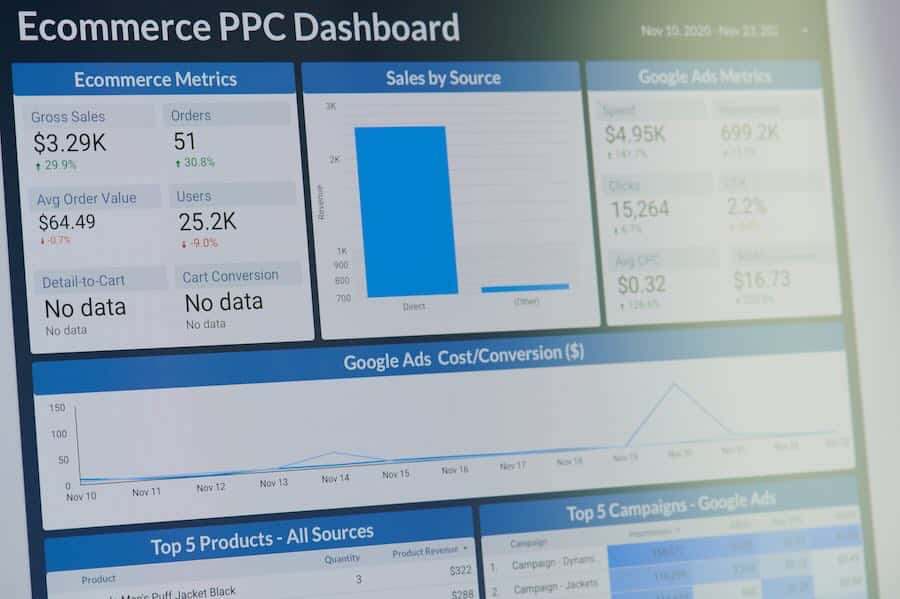
It’s not uncommon for even the most experienced marketers to mistake inquiries and leads as the same, but in reality, they’re not even close.
While both are essential for generating sales and revenue for a business, their unique attributes mean that a different approach is needed based on where that possible customer is in the sales funnel.
What is the main difference between a marketing inquiry and a marketing lead?
The biggest difference between a marketing inquiry and a marketing lead is where they are in the sales process. An inquiry is almost like someone looking through a shop window — they’re interested but haven’t made any moves to actually come into the store. A lead is a customer who opens the door and asks for a sample or tries a product for themselves.
Businesses can use lead scoring software to determine which prospects are actual leads, or if they’re still in the inquiry phase.
A marketing inquiry is when someone has shown interest in a business in some way. This doesn’t always have to be about a specific product or service and could be as simple as downloading a PDF from the company’s website. An inquiring person may already be familiar with the company and interested in discovering more information, or they could have never heard of the business before and are curious now.
In most cases, someone completing a marketing inquiry is still at the very top of the sales funnel, gathering information and resources from multiple businesses to learn more. They’re not ready to make a decision about purchasing or moving forward with a service but could turn into a marketing lead if the information they receive is what they’re looking for.
Examples of marketing inquiries
Some common ways that a business can acquire marketing inquiries are through both in-person events and their website. An inquiry could be:
- Completing a contact form online
- Downloading an eBook or whitepaper
- Subscribing to the company blog or newsletter
- Filling out an interest form at a convention or conference
What is a marketing lead?
A marketing lead is an interested person or business with the strong potential to become a new customer. They’ve gathered enough information about what the business offers to help them decide whether to purchase. Leads may also be called qualified business prospects as some element of their interest suggests that they have a high probability of working with the company in the near future.
Marketing leads are typically further along the sales funnel, but not all leads will be at the same point. Some may be ready to make a decision and buy immediately, while others are more interested than simply being a marketing lead but still need more details before they can part with their cash. This is where lead scoring software can help sales teams decide whether to invest more time into nurturing certain leads over others.
Examples of marketing leads
In both B2B and B2C businesses, a marketing lead could be an individual stakeholder, decision maker, or a whole team. But there are a few clues that distinguish these people from entry-level marketing inquiries, including:
- Spending significant amounts of time on the website
- Returning to the website multiple times over a week or month
- Making calls to the business’s sales team
- Scheduling a demo of a product or service
- Asking for pricing information
Although it’s still possible that a lead could move on to another company, these behaviors suggest a greater intent to purchase than those of a marketing inquiry. They indicate a more purchase-focused mindset, so it’s up to the sales and marketing teams to nurture these leads into customers.
How to differentiate a marketing inquiry from a marketing lead
Understanding whether someone is an inquiry or a lead is essential for running an efficient and profitable business. After all, investing the same amount of time in an inquiry as a qualified lead could be a significant waste if that inquiry never intended to move ahead.
One of the best ways to determine whether a lead is qualified or not or whether an inquiry is moving into a lead is to use the BANT system created by IBM:
- Budget: Does the inquiry have money to spend and the time and resources to implement the product or service you’re selling?
- Authority: Does the person your sales and marketing team is talking to have the direct influence to decide whether to move ahead? Are they the primary decision-makers, or will other people need to be involved?
- Need: Does the individual or business have a problem that your company can solve with your products or services? How impactful is this problem to their personal or work life that they must fix now?
- Timing. Does the prospect need this problem resolved urgently, or can they afford to wait several weeks, months, or even years and choose not to move ahead?
How to turn a marketing inquiry into a marketing lead
You can never assume that inquiries will become leads, and eventually customers, on their own. Instead, your sales and marketing teams should be following up with inquiries and helping lead them along the sales funnel until they’re ready to make a purchasing decision.
Provide sales teams with adequate resources
Both sales and marketing teams need to align on messaging to ensure that every piece of information an inquiry or lead receives is consistent. Providing the right tools to salespeople deepens the connections between your company and prospective customers, so it’s worth investing in these resources to ensure that these relationships are built well from the start.
Track and measure follow-ups
Not every inquiry will be a good fit for your business, and even those who become leads won’t all make a final purchase to become customers. Tracking all calls, emails, and other touchpoints with prospects in customer relationship management (CRM) software helps avoid unnecessary overlap that could damage your brand’s reputation with these prospects and keeps sales teams on track with their goals.
Make it personal
Every customer wants to feel understood by the company they’re potentially going to work with. Keeping essential information in a CRM allows your sales team to personalize any pitches or follow-ups, increasing the chances of a good inquiry becoming a qualified marketing lead.
Best sales and marketing lead scoring software
Businesses can quickly determine whether a potential customer is worth investing in using lead-scoring software. This can significantly reduce the sales team’s wasted time, freeing up their schedules to spend more time on the best leads possible.
To be included in the lead scoring software category, platforms must:
- Deliver features to create and manage ranking scales for leads based on company objectives and market position (for instance, a company focused on small-business customers from North America will not be interested in enterprise businesses from Europe)
- Allow users to assign scores to leads based on predefined criteria like company size, location, budget, and revenue
- Compare lead scores to company scales or benchmarks and provide reporting and analysis that salespeople can use to determine which opportunities to pursue
- Integrate with sales and marketing software solutions, as well as advanced analytics or lead intelligence
- Provide options to easily export and import data to and from the most popular file types (spreadsheets, text, PDF, etc.)
* Below are the top five leading lead-scoring software solutions from G2’s Spring 2024 Grid Report. Some reviews may be edited for clarity.
1. Salesforce Sales Cloud
With Salesforce Sales Cloud, you can grow sales and increase productivity all from one centralized dashboard. The platform has integrated sales performance management and team productivity tools to help you monitor your sales team’s ongoing performance. It also offers revenue lifecycle management and sales engagement metrics to determine where your best leads are coming from.
What users like best:
“Sales people can easily use Sales Cloud to track their work even if they don’t have a lot of technical experience. It tracks leads, accounts, contacts and opportunities and the screens are very similar so it’s easy to learn. The platform is very customizable so it can be tailored to your specific needs.”
– Salesforce Sales Cloud Review, Matt K.
What users dislike:
“I wish that Events did not automatically move to Completed after the event time has passed. It would be great if Events could be customized to require the salesperson to update the status to ensure all relevant details related to the Event are captured. When the Event auto closes it increases the “out of sight out of mind” scenarios, and reps often forget to add notes regarding the event.”
– Salesforce Sales Cloud Review, Jill B.
2. ActiveCampaign for Sales
ActiveCampaign for Sales optimizes the entire sales process from beginning to end, using powerful automated features to capture, qualify, and engage leads. With a built-in CRM, your sales team can create templates and pipelines that use data to personalize the sales experience for every potential customer.
What users like best:
“The automations and integrations work extremely well and have automated so many manual processes – pre-sale and post-sale – in our business. The Deals section really helps with tracking leads, and being able to automatically move leads through the funnel is very powerful.”
– ActiveCampaign for Sales Review, Michael T.
What users dislike:
“The editing of campaigns and automations are on two different platforms so bringing a campaign template into an automation becomes VERY problematic when trying to edit text! This is a major problem with Active Campaign – the platform is not very sophisticated and requires much troubleshooting.”
– ActiveCampaign for Sales Review, Michelle P.
3. Freshsales
With its AI-powered CRM software, Freshsales is an easy-to-use sales platform that allows businesses to attract qualified leads and grow them into customers. Using a 360-degree account view, sales representatives can manage pipelines, define and track sales goals, and engage with prospects in a way that works best for your business.
What users like best:
“It combines simple off-the-shelf functionality, with highly configurable & bespoke elements so very suitable for our specific requirements as we needed a bespoke booking system built into our CRM.”
– Freshsales Review, Georgia H.
What users dislike:
“The analytics are good however, they need a faster refresh rate, or an option to manually refresh so team’s dashboards etc can be kept more up-to-date.”
– Freshsales Review, Diego T.
4. Apollo.io
Apollo.io is an all-in-one sales intelligence platform that helps sales teams prospect, engage, and convert inquiries into leads and customers. The database includes nearly 300 million contacts at over 70 million companies, making it easy for your sales team to find the right connections at any business.
What users like best:
“Because of the platform’s user-centric design, navigating around it is a smooth experience. Our staff can rapidly become accustomed to its capabilities because of its easy layout, and the centralized dashboard offers a real-time overview of our activities. this openness has been crucial to helping us make wise choices and consistently refine our strategy for the greatest possible effect.”
– Apollo.io Review, Jiffry N.
What users dislike:
“First thing I didn’t like about Apollo is the lack of integration applications. They just support Zapier and some limited APIs if we have a CRM or any other email campaign tool.”
– Apollo.io Review, Tejender K.
5. D&B Rev.Up
D&B Rev.Up is a sales platform that allows marketing and sales teams to grow revenue by consolidating accounts, contacts, and campaign data. This gives a business a full view of prospects at every stage, giving a better understanding of where they are in the sales process to help nurture prospects into qualified leads and customers.
What users like best:
“D&B Rev. Up ABX is a game changer. I basically use it for the ABM approach, it helps in providing insights to valuable data allowing to identify target persona. Moreover it is easy to use through which one can easily leverage its capabilities.”
– D&B Rev.Up Review, Mansi S.
What users dislike:
“It is quite complex to understand and learn, much less to execute. It took me months to understand its functionality and delicacy.”
– D&B Rev.Up Review, Bhargavi D.
Lead your inquiry into becoming customers
Deciding which inquiries could become marketing leads doesn’t need to be complicated with a good scoring system and an experienced sales team. You’ll soon find your sales operations running more efficiently and, hopefully, more customers coming into your business!
Need help bringing in more leads for your company? Work with the best lead generation companies to fill your sales pipeline.





